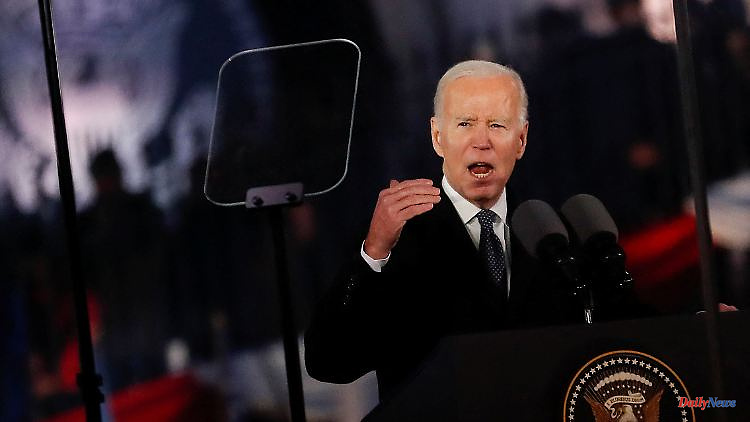US President Biden and Russia's ruler Putin hold speeches in Warsaw and Moscow on the war in Ukraine that could hardly be more different. While one focuses on the Ukrainians, the other makes them invisible - and makes a meaningful blunder with his gestures.
When Russian President Vladimir Putin and US President Joe Biden hold what are probably their most important speeches in recent months three days before the first anniversary of the Russian invasion of Ukraine, they are only about 1,150 kilometers as the crow flies. Biden speaks in Warsaw after making a surprise visit to Kiev the day before, and Putin delivers his "speech on the nation" in Moscow.
The geographical distance is as small as the rhetorical one. For both speakers use fundamentally different kinds of eloquence. The central topic of their long-distance rhetorical duel, which is the subject of this speech analysis, is the same: Ukraine.
Biden put Ukraine as a country and Ukrainians as people at the center of his speech. He is convinced that Russia will not win the war. "Ukraine will never be a victory for Russia - ever," he says. Ukraine is "strong", "proud" and "free" and can continue to count on the support of the West. His speech, which lasted just over 20 minutes, was short and sweet with a few key points:
Quite different with Putin: His speech lasts about five times as long and seems monotonous for long stretches, especially in the middle. From a rhetorical point of view, you have to give him credit: Formally, he is giving a speech on the state of the nation. Last year he had skipped the appearance that was actually required by the constitution. Such speeches are justifications to parliamentarians, who like to turn to self-congratulatory shows when dealing with autocrats and dictators, but in any case belong to the more sluggish types of speech.
Another phenomenon that can be observed, particularly in authoritarian countries, is that speeches are often lengthy and knitted down to the last detail. Ataturk was once known in Turkey for speaking for hours. An overly long speech should not be held against a speaker per se as a disadvantage - especially since in times of social media only a few "sound bites" are received, so the actual length of the speech is really only important for the audience in the hall anyway.
But what is irritating about Putin's speech: Even if it lasts almost two hours and ultimately revolves entirely around the war in Ukraine - his "special operation" - Putin hardly gets to talk about the country and the people at all. Apart from brief mentions of pro-Russian separatists in Donbass, he makes the Ukrainians invisible. Two things are at the center of his speech: the West, which he believes is mendacious, and the Russian economy with all its possibilities.
He is disappointed in the West. Responsibility for the war in Ukraine lies "with the Western elites," Putin claims, and the West "let the genie out of the bottle." He repeatedly accuses the West of lying and insidiousness, countering this with the image of a Russia that is only ever interested in cooperation and assistance. According to Putin, the West and the "Kiev regime" - to which the Ukrainian people are alien - are responsible for the war.
For almost twenty minutes, roughly the length of Biden's speech that same day, Putin hammered at the West as if fixated, combining justification for his war with a rejection of liberalism. After a reference to gender discussions about God within the Church of England, he asks pathetically and with outstretched arms: "What can one say to that? God forgive us, they do not know what they are doing!"
This choice of topic is obviously rhetorically calculated. Hiding out the Ukrainian victims of the war points to the heart of his war: he denies Ukraine's right to exist. If he had his way, the country would only exist as a Russian province. With his rejection of progressive ideas from the West, he is trying to dock onto Western discourses and possibly find listeners there - after all, it is part of Western liberalism that social developments are discussed controversially.
Putin then devotes almost an hour to Russia, which he believes is economically resilient and powerful. He presents new social and cultural projects down to the last detail, talks about university reforms and high technology. It's a part of the speech that seems long-winded and monotonous. At the same time, it is the part in which Putin is sure to appear - informed in detail, equipped with key figures on economic development.
There is not a trace in this speech of the frailty that Putin is said to have - with a bloated face, a wooden gait and fidgety behavior. Nevertheless, he makes a gesture faux pas. It could be a moment of inattention where he subconsciously lets on nervousness. After a minute-long description of pollutants in garbage dumps and the cleanliness of rivers, Putin ends his speech by saying that Russia will suspend the New Start treaty with the United States. This agreement is about the mutual control of the nuclear arsenals of both countries.
"And a few more words about what is happening around us," Putin begins this point. Here he seems nervous for the first time during his speech. He clears his throat, hits the microphones in front of him with both hands and grabs his jacket.
It's just a short moment in a long speech. But anyone sitting in the audience or in front of the television who knows Putin is getting a message that contradicts Putin's performance: he gets nervous when it comes to the United States. It seems to be his anxiety issue.
In the following, an ambiguity between deep disgust and latent admiration appears in his descriptions of the USA. He describes US behavior toward Russia as "the height of cynicism or the height of stupidity." Then Putin adds: "But I don't think they're that stupid. They're not stupid people."
Even Biden does not deliver a masterpiece in Warsaw when it comes to the delivery of his speech. He gets muddled several times with syllables that sound the same and starts to stutter. But with the 80-year-old, the audience is now used to something like that. After all, despite his age, he speaks passionately and full of energy - and puts the Ukrainians at the center of his speech and a simple idea of freedom.
Biden's empathy seems believable. Especially when he leaned forward and whispered pathos to the crowd about the status quo after a year of war: "Ukraine is still independent and free." He not only shows empathy for the Ukrainians. One also buys his emotional emotion when he asks his Warsaw audience to look at one another and be proud of how many Ukrainian refugees Poland has so hospitably taken in.
As credible as such moments in Biden's speech are, other passages are just as pathetic, almost pompous. For example, when Biden states that Putin considered himself "tough" but then encountered "America's iron will".
In this speech duel with Putin, however, Biden has the better starting position anyway. Unlike, for example, during the Iraq war, support for Ukraine in the West is largely undisputed - Biden and with him the USA as a whole can see themselves on the right side. He can focus on what American politicians have always been good at rhetorically: creating the image of a heroic struggle for freedom. Good versus Evil. Simple messages, but ones that seem rhetorical.
The art of rhetoric is thousands of years old. According to a creation myth, it was created in the 5th century BC after the fall of a tyrant from Syracuse on what is now the island of Sicily. Speech teachers appeared and coached citizens before disputes over territory. Even today, the art of the long speech remains relevant - in the struggle for the territory of Ukrainians.












